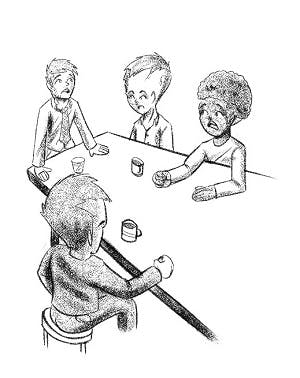Historically, I would spend hours preparing to moderate roundtable discussions with diverse groups of senior executives. I would present emerging trends, new research, best practices, and lots of provocative questions meant to elicit personal reflection and engagement within the forum community. I mistakenly believed my role was to be the primary educator and inspiration of the gathering, but quickly realized that the participants contributed a collective insight that was far more valuable than any personal contribution.
This is the power of your brain trust. Some of the wisest leaders I know are experts at harnessing the whole room. They thoughtfully create a brain trust of advisors to test ideas prior to finalizing their thinking. The smartest person in the room – is always the room.

In the last twenty years, only two of Pixar’s twenty films have flopped. They have created some of the most successful, innovative, and commercially relevant films of the last two decades (Toy Story, Monsters, Inc., Finding Nemo, The Incredibles, Up, Brave, and WALL-E). How have they done it? Co-founder of Pixar Animation, Ed Catmull, says it’s simple: the brain trust.
In his bestseller, Creativity Inc., Catmull says, “For all the care you put into artistry, visual polish frequently doesn’t matter if you are getting the story right.”
Brain trusts are comprised of advisors whose only concern is leading someone to their most optimal outcome. Their analysis is unaffected by external forces, and they care deeply about a project’s success – enough to be completely candid about problems. Catmull states that brain trusts are excellent at “stripping down a story to its emotional, load-bearing sequences and then rebuilding it from the ground up.” They are engineers of objectivity, and they are essential to one’s strategy.
A necessary element to a successful brain trust is a healthy candor. As Catmull has said, “We believe that ideas – and thus, films – only become great when they are challenged and tested.” An effective brain trust eliminates hierarchy and power figures in the group, assessing the creative process (or art), not the artist.
The best brain trusts enlist people who offer a unique vantage point; who are open, progressive, and healthy leaders; who address broader solutions. Effective brain trusts liberate us. We are all prisoners of our personal biases.
ECRM does just this with the roundtable discussions that it hosts at its in-person sessions. The team will set up four or five tables, each representing a key industry topic, and moderated by an ECRM team member or session participant. Retailers and brands are notified of the topics in advance, and during the roundtable segment, they select their table topic, then sit for a casual, off-the-record conversation on that topic for 30 minutes. Then they break and select another table topic for 30 more minutes.
ECRM VP of Content Joseph Tarnowski then interviews each moderator on video about key takeaways from their discussions. In this way, ECRM is tapping into the collective brain power of the retailers and brands gathered for the session, and then sharing those insights with the industry.

We all need a brain trust.
Maybe the biggest blind spot in leadership is the illusion that wanting to see clearly is the same thing as seeing clearly. I frequently work with leaders who care deeply about being sound in their reasoning and receptive to critique. This is something we should always strive for, but it isn’t enough. Personal biases affect our reasoning, which is why we need a brain trust.
Robert Cialdini, Regents’ Professor Emeritus of Psychology and Marketing at Arizona State, reminds us in his book, Influence: The Psychology of Persuasion, “we all fool ourselves from time to time to keep our thoughts and beliefs consistent with what we have already done or decided.” Our need to stay consistent with our views of ourselves is a very powerful motivating force.
A brain trust works to dismantle our instincts. Here are some of the biases a brain trust can help us overcome:
Confirmation Bias. We look for ideas to confirm our own personal views.
In-Group Bias. We often favor people who are like us.
Social Proof. We are influenced by people with title, power, or influence.
We all suffer from personal biases and a trusted brain trust allows you to see through other’s eyes. Who are the core members of your “Brain-Trust?”

